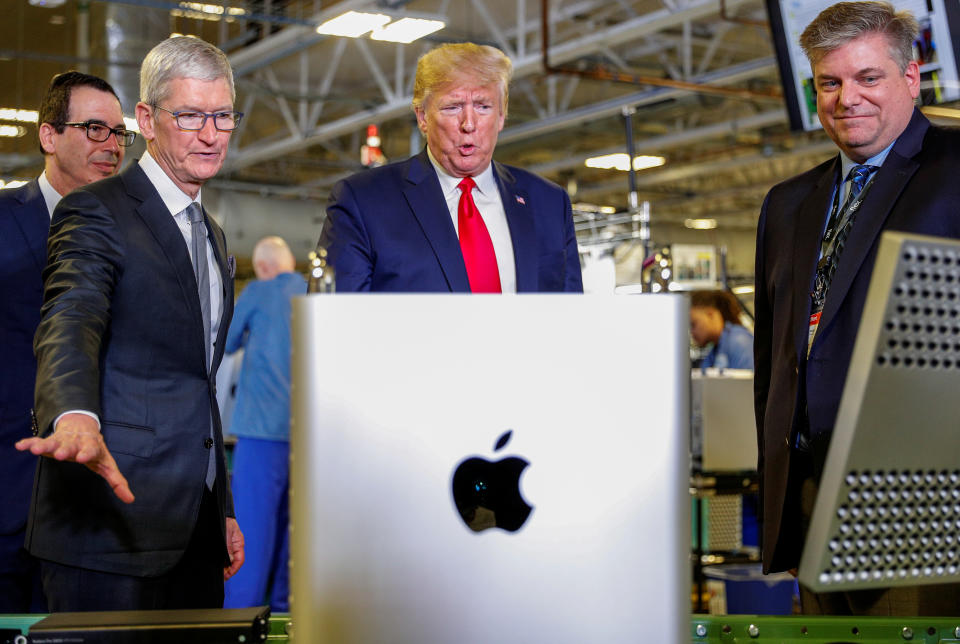How the Trump administration favors Apple
Apple CEO Tim Cook pops up frequently alongside President Trump. He gave Trump a tour of an Apple factory in Texas on Nov. 20 and has visited the White House several times. Trump and Cook even had dinner together over the summer.
Trump is not Cook’s type of guy. Cook supported Trump’s opponent, Hillary Clinton, in the 2016 election, and he has spoken out against Trump’s policies on immigration, trade and climate change.
Yet Cook’s odd-couple relationship with Trump may be paying off. Apple (AAPL) has gotten far softer treatment under Trump’s trade policy than other companies have, sparing much of its sprawling supply chain in China. If new tariffs go into effect as scheduled on Chinese imports on Dec. 15, Apple could even end up with a competitive advantage, if the favored treatment continues.
Trump has imposed tariffs ranging from 15% to 25% on about $370 billion worth of imports from China since last year. The American importers paying those tariffs can petition the Commerce Department for exemptions. Apple has—and has enjoyed a remarkably high success rate.

Data from research firm Panjiva, a unit of S&P Global Market Intelligence, shows that Commerce has granted 62.5% of Apple’s requests for tariff exemptions on the largest set of tariffed products, known as “List 3.” The exemption rate for all companies requesting exemptions is just 5.9%. So Apple is 11 times more likely to get an exemption from the Trump administration than the typical company.
Apple also commands prompt attention. Commerce has reviewed 100% of Apple’s exemption requests, according to Panjiva. The average for all companies is just 10.9%. This data covers $213 billion worth of imports hit with new tariffs last year. It does not include an additional $112 billion worth of new imports hit with tariffs on Sept. 1. That list also includes products Apple is seeking exemptions for, including AirPods, the Homepod smart speaker and the Apple Watch. Commerce hasn’t yet ruled on those.
Favoritism or just effective lobbying?
It’s possible Apple receives special treatment because of Cook’s relationship with Trump. But it could also be Apple’s acumen and resources as an American tech giant. “It’s tough to say there’s favoritism,” says analyst Chris Rogers of Panjiva. “I think the fact they have a big legal and lobbying department would mean that the submissions they make will be higher quality, and better followed up than many other submissions.”
Trump has said he plans to impose another 15% tariff on a new set of consumer imports from China on Dec. 15, which would include electronics like laptops and smartphones. That would hit Apple’s lineup hard, since the iPhone, iPad, MacBook and other key products would be subject to the levy.

In 2018, Cook said he didn’t think iPhones made in China would get tariffed. The trade war has intensified significantly since then, and Cook has been more circumspect in recent remarks. Trump, however, sounds like he has Apple’s back. During the Nov. 20 visit to Apple’s Texas plant, Trump said he was “looking at” exempting the iPhone from the coming tariffs.
Samsung, a top Apple competitor, has wound down production in China, while making phones for the U.S. market in many countries not subject to the new Trump tariffs. So a new import tax on Apple phones would give Samsung, a foreign company based in South Korea, a cost advantage. Cook explained that to Trump when the two dined together in August. “He made a very compelling argument,” Trump said afterward.
Trade experts generally dislike tariffs, since they’re a tax on Americans that puts the government in the position of picking winners and losers. The exemption system further distorts the process, with bureaucrats deciding who pays the tariff and who doesn’t. A company like Apple that’s able to free itself from tariffs can actually benefit from protectionism if competitors are less successful in the exemption process. Still, Cook advocates free trade without tariffs, rather than favors from the government.
Rick Newman is the author of four books, including “Rebounders: How Winners Pivot from Setback to Success.” Follow him on Twitter: @rickjnewman. Confidential tip line: rickjnewman@yahoo.com. Encrypted communication available. Click here to get Rick’s stories by email.
Read more:
Read the latest financial and business news from Yahoo Finance
Follow Yahoo Finance on Twitter, Facebook, Instagram, Flipboard, SmartNews, LinkedIn, YouTube, and reddit.
